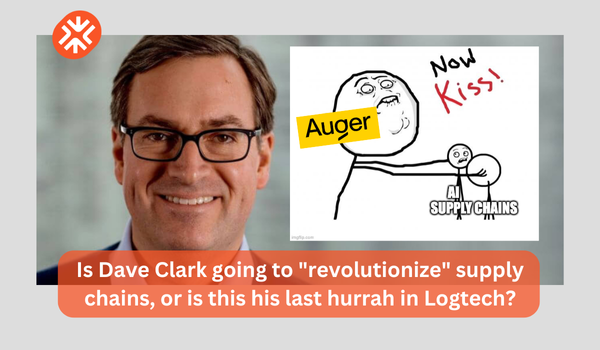Goodbye, Flexport. Hello, Flexpeditors.

Shopify and Flexport have been gradually growing closer, as both look to solve their respective pain points. On the one hand, Shopify is seeking to emulate Amazon's success, a desire which has cost them about $2bn in write-offs after giving up Deliverr for some Flexport stock. On the other hand, Flexport desperately needs customers to justify both their valuation (which between us is unjustifiable, more on that later), and their decision to become "another 3PL".
Is Dave Clark about to hit the logistics world with a master class in 3PL building, or will the ex-Amazonians leading Flexpeditors... Sorry, Flexport's charge be left with egg on their faces and regretting the Amazon glory days?
Flexport finally knows what it is... kind of.
In all honesty, I was expecting FleXPO... I mean Flexport, to do something with the struggling C.H. Robinson. That would have been some kind of merger, allowing C.H. Robinson to renew their image and Flexport to really establish itself in the US Freight scene. Maybe it was too big to happen, or maybe it will still happen.
Right now, Flexport has decided to go down the path of the 3PL. Dave Clark's words are still bouncing around in my head and fill me with expectation and excitement.
"We're still a freight forwarder and we're going to continue to grow that business," Dave Clark told Eric Johnson at the JOC. Adding that "we have a customs business that we've segmented, and we've added a small business team, and we're adding e-commerce fulfillment and last-mile. it's an acceleration of our end-to-end vision." Let's also remember that they charter a couple of planes, already operated their own warehouses, and have now decided they'll also have a small trucking business.
What about the tech?
Although Dave Clark didn't forget to mention that Flexport is still a freight forwarder, he did once again omit the "digital" prefix, and software was not a core part of any of the communications yesterday.
Raising over $2bn to build the industry's next big Logtech name, how did they end up becoming "just another 3PL"? We hardly hear any mention of that tech today, which leads to a few possible conclusions:
- The tech was bad so they went for plan B
- The tech is good and they will use it to conquer market share and break into the top 25 3PL list
- The tech never really existed in the first place, which is why they didn't look to replace CTO James Chen when he left in November of last year
Realistically speaking, Flexport has most likely built an internal solution that allowed them to operate as a forwarder but lacks the breadth and depth required to pull off this end-to-end strategy. As you all know by now, I cannot mention the "breadth and depth" of logistics technology without talking about CargoWise.
Divest, cash in, and use the best solution out there?
The year is 2025 and Flexport is wrapping up its global roll-out of CargoWise, including its new US landside offering.
An unimaginable future not so long ago, and yet... I cannot help but wonder how Flexport plans to compete with the likes of Maersk, or how Shopify hopes to use Flexport to challenge Amazon's Prime Logistics arm, without using the best software money can buy. With WiseTech's recent pivot into first and last-mile logistics, it seems like these companies' futures are intertwined.
One of the main reasons behind this hypothesis is that Flexport does not have the luxury of time. And it will take them at least another decade to build out the functionality they need. Sure, they can go on an acquisition spree, but integrations also take time. Their 3PL strategy and aligning themselves with Shopify is not without risk, are they willing to increase their risk profile by choosing to build vs buying software?
Where would this hypothetical situation leave Flexport's proprietary solution? The most likely situation is that they have built an FMS that works well for a small to medium-sized US forwarder. We'll either see them drop it altogether, or spin off another entity to continue innovating in the software space, competing with the likes of GoFreight and Magaya.
Let's imagine for a second that Flexport wants to build its own tech.
This is where things get really interesting. When talking about the company's technology, Dave Clark's answer echoes things we've been hearing from others in the industry.
Flexport will address the problem most companies face with unrelated transportation partners on disparate supply chain technology platforms that aren't interoperable.
Is anyone else getting strong Maersk vibes, right about now?
So platform interoperability for SMB forwarders is what they want to solve. And to do so, they plan to bring yet another platform to the party. Interesting approach. Combine the desire to use their own software with this interoperability problem, and you get another CargoWise-esque ecosystem that is closed-off and designed to keep you in.
Is that Flexport's plan? Provide SMBs with a single solution that handles all their needs through ShopifyxFlexport? With no freedom of choice and the idea that this approach solves interoperability by removing it?
As they say in France: "Le NON".
Interoperability in LogTech is a feature, not a bug.
As a fan of Tolkien's Lord of the Rings books, I admire any "one ring to rule them all" strategy. But in the case of LogTech, it doesn't really work. I can see where Flexport is coming from, but the belief that having a complete offering will remove interoperability issues is narrowminded.
Unless Flexport has no desire to expand its customer base beyond companies using Shopify, in which case sure it can work, but where is the fun in that, and what guarantees are there that Shopify will survive if they keep writing off billions due to poor decision making at the top?
You build tech interoperability by having a platform built to communicate with other platforms without friction. Even CargoWise is starting to wrap its head around this, or at least we can hope that will be the case once they've released their BCO-facing NEO product, which should integrate with BCO systems in some way to truly be valuable. In the meantime, the likes of Prompt Global and Chain.io are there to fill the gaps. The former recently announced a FourKites to CargoWise integration, and the latter partnered with the likes of Magaya.
Why is interoperability important? You need to integrate with customer platforms, third parties, and partners. An evergrowing ecosystem of different systems each offering a unique set of challenges.
The question remains: if Flexport is planning on being a viable solution for customers not using Shopify, how will they handle integrations?
Is Shopify enough of an insurance policy to be competing with everyone?
Not so long ago, we thought Flexport would be competing with the FMS providers such as Magaya, GoFreight, and CargoWise. Fast forward a year or so, and they are now competing with 3PLs, Integrators, Amazon, and SMB forwarders. Do you need to make friends with billions in the bank and hubris on your side?
With Shopify now owning 18% of Flexport, yet Flexport not having to give up any of their war chest for it, this leaves them in an interesting position from which to expand, and rapidly. Shopify isn't exactly the picture of health, and is one recession, or another $2bn write-off, away from having to rethink its strategy (again). Flexport needs to act fast.
And then there is Amazon. Will Amazon sit by and quietly let their noisy weird cousin chip away at market share and continue gaining ground? Maybe. It depends on how much of a threat the ShopifyxFlexport relationship ends up being in the immediate future.
Flexport is going to need to be bold in its acquisition strategies.
The likes of Maersk and CMA have been spending like their survival depends on it. To be fair it's probably the case as they all attempt to outdo each other with each M&A announcement.
Flexport is clearly not the only one in the market for some great businesses. DSV, K+N, and Geodis have all made some moves recently in North America. The space is getting crowded, and Flexport needs to grow its 3PL offer before valuations start trending upwards, buoyed by increased interest from European giants keen to conquer the Americas.
You may have already read my suggestion that Flexport will acquire medium-sized forwarders in LATAM. We'll probably see some activity in key Asian markets, as well as acquisitions in newly announced domestic interests such as trucking. It feels like there is a long way for Flexport to go before they'll be able to offer that "Shopify Shop Promise" nationwide.
Do they have the money and the know-how to opportunistically acquire part of DB Schenker or C.H. Robinson, should the opportunity present itself? Stranger things have happened.
This move by Flexport is a complicated one to fully digest. Are they putting all their eggs in a Shopify-shaped basket and hoping for mutual success through a closed ecosystem? Or will they embrace the need for interoperability and see the market as a whole, increasing the pressure on integration building and software prowess?
Competing with Amazon and Maersk, the 3PLs, the integrators... As an outsider with a Frankenmonster of a partnership, put together out of necessity, after big pivots away from strategies on both sides. Flexport almost seems to have all but given up on its dream of technology disruption, instead embracing the path of least resistance.
Having built a 3PL while masquerading as a tech company has allowed Flexport to raise more money than a 3PL could have, and reach mouth-watering valuations.
Method to the madness, or a desire to emulate best in class and try to make something out of several billion dollars of invested funds?
It's time to find out.
But whatever happens, as logistics professionals and tech enthusiasts, we have to thank Flexport for the attention their story has brought to our industry. Without their bravado and hubris, a large number of Logtech upstarts and scale-ups wouldn't be here today, and much of the funding would have gone to other industries.
Now that this industry has enough power of attraction to stand on its own two feet, it's time Flexport actually delivered something truly innovative and industry-changing, just like it promised.





